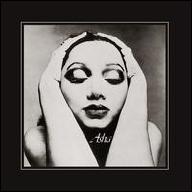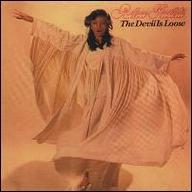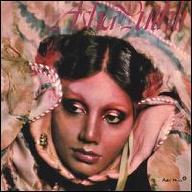Puthli was born in Mumbai in 1945, two years before India won independence from Great Britain. Her family possessed the resources to provide her with the luxury of a musical education. Although she was Hindu, she attended Catholic schools where she studied the Indian classical vocal tradition, Western opera, and dance, but was deeply taken with the jazz she heard on Voice of America and Dusty Springfield's pop hits on Radio Ceylon. At 13, she started taking female-vocal slots with local bands. Her teachers told her that singing pop music could damage her technique, but she chose pop anyway.
In her late teens, she began singing in jazz clubs in Mumbai and auditioning for films. New Yorker contributor Ved Mehta saw her perform and devoted part of his article on jazz in India to her. In 1967, she visited a location where Ismail Merchant and James Ivory were filming The Guru. After hearing a call for silence on the set, Puthli, anxious to be discovered, let go a big, operatic laugh. Merchant demanded to know who had laughed, and Puthli launched into a routine that included a false apology. Identifying her as a performer who could project vocally, he rewarded her with a bit part.
Puthli was determined to make it in America. She got a job as a flight attendant for British Airways and traveled internationally. She auditioned for choreographer Martha Graham, won a scholarship to study with her dance company, and moved to New York City. In the Big Apple, she tracked down Mehta, who generously introduced her to legendary Columbia A&R man John Hammond. He produced the single "Asha's Thing," but it went unissued. Hammond also introduced her to the Peter Ivers Blues Band, with whom she cut a cover Marvin Gaye's "Ain't That Peculiar." Hammond was deeply impressed by a quality in her voice he couldn't quite place, but he believed in her talent and audacity. Ever the visionary, he had been talking with Ornette Coleman, who was seeking a very particular kind of female vocalist. Puthli, Hammond knew, fit the bill. At his suggestion, Coleman hired her to sing two songs on 1972's still visionary Science Fiction: its iconic opening track, "What Reason Could I Give," and "All of My Life." For her efforts, Puthli was voted best female jazz vocalist in DownBeat’s critics' poll.
During the early '70s, vanguard jazz was hardly a best-selling proposition. Columbia recording contract in hand, Puthli traveled to England. She appeared in Merchant-Ivory's 1972 film Savages and began working with pop producer Del Newman (Elton John). The result was her eponymous 1973 debut album. It featured a wide mix of styles, from rock to R&B and funk. She covered songwriters including Bill Withers, Jimmy Webb, and J.J. Cale. The set highlight was her brazen cover of George Harrison's "I Dig Love." Puthli shifted the song's emphasis to focus on the sexual rather than the spiritual. The track became a staple in British clubs. The following year, she released her sophomore long-player, She Loves to Hear the Music. Still emphasizing pop, she enlisted Miles Davis producer Teo Macero and recorded lush, funky pop songs by Carole Bayer Sager, Van McCoy, and Neil Sedaka (the set's single was her reading of his "Laughter in the Rain") as well as songs by the team of Kenny Gamble and Leon Huff, and Cole Porter (at Macero's suggestion). The album also contained a pair of originals: "You've Been Loud Too Long" and "Paper Doll."
Given the positive reaction her recordings received from discotheque crowds, Columbia and Puthli were restless for a radio hit. Determined that she would crack the charts with her next release, she went to Germany to work with producer/composer Dieter Zimmermann and arranger/conductor Dave Virgin King. The trio co-wrote The Devil Is Loose and hired the Berlin Chamber Choir, Strings of the Berlin Opera, and a studio funk band. Issued in 1976, the album was ahead of its time. A collection of space age proto-disco, it wove bumping basslines, electronic beats, and expansive layered vocal harmonies into club gold. While it did chart in Europe, it faltered elsewhere, although DJ's and dance fans cherished it. It is easily the most reissued title in her catalog. Her classic single "Space Talk" was sampled by Notorious B.I.G. for "The World Is Filled" in 1997. Though Puthli wasn’t setting the charts on fire, her popularity in India was on the rise. Her records were played on radio and in clubs, and her constant presence in fashion magazines won her a substantial fan base.
She issued her final album for CBS in 1978. Recorded in Brussels with producer Jean Vanloo, it was given three very different releases. In Europe, it was initially released simply as Asha; in England and the U.S., it was titled L’Indiana. Further, each version had a different track listing -- some contained eight tunes while others had six with extended mixes. A Euro-pop disco offering top to bottom, it didn’t fare well in the marketplace, and Puthli was dropped from her contract.
In 1979, she did an extensive fashion shoot with photographer Richard Avedon and released the album 1001 Nights of Love for Phillips subsidiary Autobahn Records. Produced by Rainer Pietsch, the set offered nine deeply funky, slickly produced co-written originals with Pietsch, a composer, singer, and producer of European pop and disco. She followed it quite characteristically with I'm Gonna Kill It Tonight in 1980 for the same label. Also produced by Pietsch, it was co-written by the pair, and its sound centered on new wave and synth rock. They followed it with Only the Headaches Remain, Puthli's final album of the '80s. Other than an appearance on Henry Threadgill's 1989 Novus album Easily Slip Into Another World, she spent most of the decade and much of the '90s raising her newborn son and recording for Bollywood.
In 1990, she briefly emerged with the cassette-only release Hari Om, a strange, futurist amalgam of electro, Indian music, and abstract pop. She re-emerged again in 1998, delivering the singles "Destiny" and "Again" as a featured soloist on the award-winning Bollywood soundtrack for Monsoon. Later that year, she self-released the cassette-only The New Beat of Nostalgia, a collection of Hindustani pop. During the late '90s and early 2000s, rappers and dance music and electronic producers often sampled her '70s work. Besides Biggie, Jay-Z sampled her songs for The Blueprint 2.1. Puthli was unaware of the millennial appeal of her music until her son told her that New York DJ Sean Dinsmore had paid more than 100 dollars for one of her albums. She subsequently contacted him and sang on an Indian-flavored track called "Diwani Diwana" by the Dum Dum Project.
Though a trained singer in Carnatic music, Puthli rarely sang it during the '70s and early '80s when she was most active as a recording artist. As electronic music became pervasive, so did its preoccupation with appropriating music and samples from other cultures. She was suddenly in demand as an Indian singer. She appeared on two albums by Bill Laswell in that role: 2003's Asana, Vol. 3: Peaceful Heart and Asana Ohm Shanti in 2006. She also sang on Stratus' charting Fear of Magnetism in 2005 as well as on dozens of white-label chillout records. She received co-billing as a featured collaborator on Leo Cesari's hit long-player Bossalenta in 2008. In 2009, she released Lost on Kyrone. Produced and arranged by Mauro Paoluzzi, its star-studded studio cast included Sheila E. guitarist Phil Palmer, violinist Ian Cooper, and classical tenor Walter Barbaria. The 11-track program included compelling if idiosyncratic readings of Procol Harum's "A Salty Dog," Edwin Starr's "War (What Is It Good For?)," a new version of "The Devil Is Loose," and two songs in Hindi.
In 2019, she was a co-billed collaborator on Tuscan singer/songwriter Gabriel Grillotti's charting single "Je Crois C'est Ça L'amour." (A huge fan of Puthli's, he owned the Kyrone label and signed her for Lost). In 2021, Mr. Bongo reissued The Devil Is Loose. They followed it in 2022 with The Essential Asha Puthli, a massive 20-track anthology that covered her work with Coleman, the Surfers, Charlie Mariano, songs from soundtracks, and prime selections from her own catalog of releases. ~ Thom Jurek, Rovi
















